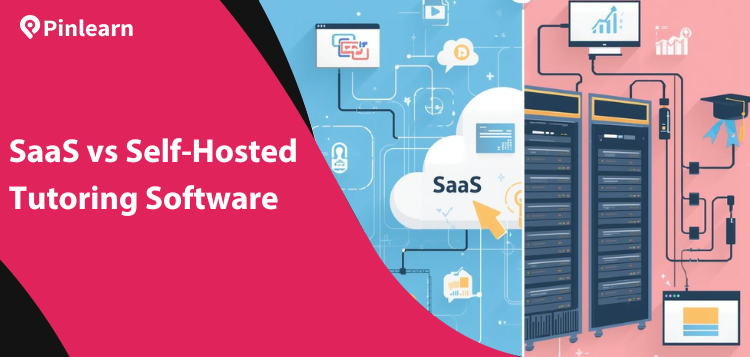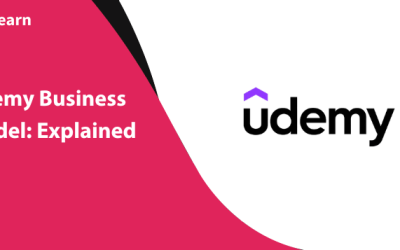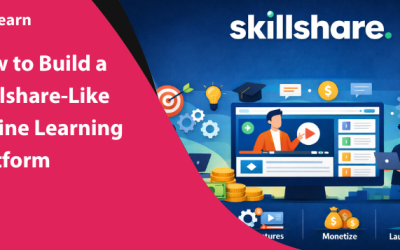SaaS vs Self-Hosted Tutoring Software: How to Choose the Right One?
Choosing your tutoring software is a crucial, yet challenging task. But, deciding whether to opt for a SaaS or self-hosted tutoring software is the real challenge.
Well, these are the two primary choices to build your online tutoring software. Your tutoring business performance, security, and operational costs depends on — this one significant decision. So, with so much at stake, how do you decide what’s best for your business?
We’ll evaluate both types of tutoring softwares and guide you to pick the right one in this detailed SaaS vs Self-hosted comparison.
So, are you ready to embrace valuable insights and transform your business?
What is SaaS Tutoring Software?
SaaS stands for Software-as-a-service, and a SaaS tutoring software is hosted on a cloud-based system. Tutors and students can access the applications, tools, resources (sessions and courses) from anywhere. The infrastructure including the hosting, domain, and feature development is all managed by the vendor.
In simple terms, it’s similar to how Dropbox or Google Drive works. You can access the files or documents from the cloud, make changes and upload it on to location. The third-party service provider manages the technical aspects, and you pay a monthly or annual subscription fee for the services. This offers you more time to host engaging sessions, student management, and building courses.
Pros
-
High Accessibility
Students and tutors can access the software from anywhere – any location or device. This offers a seamless and flexible learning experience.
-
Easy Deployment
SaaS often requires no or low installation setup as it is already set up by the provider. So, solo tutors can immediately host live sessions once they sign up.
-
No Technical Knowledge & Easy Maintenance
Infrastructure and management is one of the complex parts of tutoring business. In SaaS, the vendor handles everything from hosting to feature development. With downtime and technical fixes out of sight, tutors can focus on growing their business.
-
Third-Party Integrations
Automating different workflows like scheduling, billing, email often demands specific integrations. SaaS easily integrates with different softwares offering a smooth learning experience.
Cons
-
No Ownership & Branding Challenges
The biggest downside of SaaS is you don’t own the software. There’s limited control or freedom to customize different features and functionalities. Also, the branding is restricted to few templates, backgrounds or colors
-
Over-Dependency on Provider
The platform vendor manages hosting, feature-development, domains, and major technical needs. This means businesses depend on the provider for updates, bug fixes, or any other support. The result is less control over performance, storage limits, and hosting.
-
High Long-Term Costs
Imagine paying a subscription cost every month for software access. Over the years, it compounds to a significant amount and subsequently higher than a one-time fee.
-
Limited Customization
Feature development and design flows are handled by the platform vendor. So, extensive customizations like branding, unique design flow, or gamification, isn’t possible or requires higher cost.
-
Migration Challenges
If you decide to migrate to another vendor later, migrating data into a different format is challenging. This could be resource intensive or tedious!
What is Self-Hosted Tutoring Software?
A self-hosted online tutoring software is an educational application that you install and run on your hosting server. Unlike SaaS, self-hosting software is owned and managed by the user. Right from the infrastructure to the feature development and updates, the user has complete control on everything!
Typically, businesses get the software for a one-time development cost and it often comes with a life-time license. Some tutoring softwares like Pinlearn even offer a 100% open-source code for deep customizations and integrations. The significant shift from “renting to ownership” works great for businesses and maximizes revenue.
Pros
-
Complete Ownership & Branding
Self-hosted software have complete control over infrastructure and data. It runs on the server and moreover you oversee everything from design flows to feature development. It’s a go-to solution for complex business needs, high end-customization needs, and specific tutoring niches.
-
Fully Customizable and Secure
Whether you want to integrate an LMS, a local payment gateway, or design workflow, self-hosted software makes it all possible! Also, since you have complete control over hosting and feature development it’s more secure than SaaS solutions.
-
Shorter Development Cycles
Ready-made tutoring clone scripts like Pinlearn offer a tried and tested MVP that are market-ready. So, the entire development timeline is shorter and also includes customizations. The end result? You can launch your product within weeks!
-
Cost-Effective in the Long Run
Unlike SaaS solutions, self-hosted softwares incur a one-time cost without any recurring charges or renewals. This includes free installation and setup and timely support and updates.
Although SaaS offers a lower upfront cost, there is a significant investment in integrations and scalability. For instance, adding more users can increase the cost substantially.
-
High Scalability & Integration
Self-hosting offers great flexibility with customizations. From servers to network configurations, you can control every aspect of the infrastructure. Thus, entrepreneurs can build a tutoring business that’s well-fitted to your business needs. Even integrations get easier, as there isn’t any dependency on vendor platforms.
Cons
-
Initial Setup & Hosting
Self-hosted solutions provide complete control over technical aspects and data. Hence, requires a basic setup and hosting initially. This one-time step often provides customization and tailored user experience.
-
Planning Scalability & Customization
Planning your scalability and customizations beforehand is essential for long-term business success. Keeping this in mind, you need to design unique workflows and identify your infrastructure requirements while laying your business plan. This isn’t often possible in SaaS solutions.
SaaS vs. Self-Hosted Tutoring Software: Key Differences
Here’s a comprehensive SaaS vs Self-Hosted pulling off the major difference:
| Key Points | SaaS Tutoring Software | Self-Hosted Tutoring Software |
| Hosting & Infrastructure Management | Managed on cloud by third-party vendor | Managed by businesses |
| Ownership & Data Control | Limited control over infrastructure and data | Complete control over infrastructure & data |
| Customization | Limited customization | Highly customizable |
| Branding & White-Labeling | Limited branding possible | Seamlessly build personalized brand |
| Scalability | Limited Scalability | Scalable environments can accommodate even large tutoring businesses |
| Third-Party Integrations | Basic plans often don’t include integrations | In-built integrations with Zoom, payment gateways, email APIs, etc. |
| Cost | Low-upfront; less cost-effective in the long run | One-time cost; Profitable in the long run |
| Market-ready and Launch Time | Minimal setup and quick to start; lacks significant features and customizations | Ready-to-use & quick launch; basic MVP reduces launch time |
| Security Control | Less secure | More secure, especially on-premise hosting |
| Vendor Dependency | Over-dependency on vendor | Self-hosted & no dependency on vendor |
| Support and maintenance | Low maintenance hassles | Control over support, upgrades and technical issues |
Why is Self-Hosted Tutoring Software More Relevant?
Here are five key advantages of self-hosted tutoring softwares over SaaS tutoring softwares:
-
Cost-Effective
Self-hosted tutoring software costs a single-time fee and with life-time license. In contrast,SaaS software charges an ongoing subscription cost as a monthly or annual fee. Depending on the size of your tutoring business like users, storage you need to choose your plan. However, over time these monthly payments add up to significant overall cost.
-
Highly Customizable & Source Code Ownership
Deep customization is one of the advantages of self-hosted tutoring softwares. With 100% source code access, you can seamlessly tailor the software to your business needs. You can integrate specific workflows, control the environment and also the overall performance of your software.
-
Branding & White-Labelling
A clear value proposition and unique branding is the need-of-the-hour to master the tutoring landscape. The complete control over source code and feature development process helps in building your unique brand. From the look-and-feel to personalized learning and content delivery, a self-hosted solution offers an edge at every step!
-
Market-Ready and Quick to Launch
With a MVP already in place, you have set up a solid foundation for your business. Self-hosted solutions come pre-built with essential features and functionalities.
Additionally, they inherently support customizations and add-on integrations. This reduces the time to launch and market. Above all, you can launch your product in weeks!
-
More Scalabile Environment
As you build and grow your tutoring business, the overhead cost to expand your business is substantial. Adding users, scaling your CMS or file storage, integrating multiple pricing models, all are a part & parcel of scaling up.
Now, all this gets challenging with SaaS. Blame it on the vendor lock-in period, billing frameworks, upgradation cost and platform policies. However, self-hosting edges ahead with open-source code access, flexible infrastructure and less waiting time!
-
Industry-Proven Model
Most self-hosted tutoring software platforms are time-tested rather than overnight experiments. High-performance and leading educational platforms are often self-hosted. Their long-term scalability and proven, customizable architectures make them favorable for all types of tutoring businesses.
-
Security
Self-hosted softwares employ robust security practices like multi-factor authentication and role-based access. It also offers data localization and compliance with GDPR and other regional laws. You own your data, rather than hosting them in third-party vendor services.
On the other hand, SaaS software is restricted by the vendor’s security practices. Any security attack or malware attempt can compromise your data and privacy.
Well, we have reached the end of this detailed SaaS vs Self-Hosted comparison guide. But, here’s a bonus section for you!
Can I Migrate from SaaS to Self-Hosted Tutoring Software?
Yes, it’s possible to migrate from SaaS to self-hosted tutoring software. Given the advantages of self-hosting, many SaaS businesses are considering the significant shift. This gives them ownership, greater scalability prospects, and saves costs in the long run.
The migration process involves the following aspects:
- Evaluating your current platform features, integrations, and pages.
- Picking the right self-hosted tutoring solution
- Customizing and building your self-hosted solution as per business needs
- Exporting all business data — student and tutors profiles, payments, bookings, course content
- Third-party integrations like Zoom, Stripe, SendGrid, etc
- Finally, test and launch your tutoring platform
Eduww is an international K-12 online school offering learning programs for elementary to high-school students. The platform offers flexible 1-on-1 and group tutoring sessions from subject experts. It offers the perfect virtual learning environment with interactive tools, 24/7 LMS, and innovative curriculum.
The popular platform recently migrated from SaaS to self-hosting with Pinlearn’s feature-packed ready-made tutoring software. They are now running their online school successfully overcoming the SaaS limitations!
Final Verdict
To conclude, both SaaS and self-hosted tutoring softwares are well-suited for different scenarios. Both have their advantages and disadvantages. The choice depends on your hosting & deployment, scaling needs, integration, and budget.
SaaS is suitable for solo tutors with basic functionality and customization needs. Self-hosting is a compelling solution for businesses who desire more control, scalable environments and unique branding.
Lastly, functionality, time and money are equally invaluable. With the flexibility and affordability offered by self-hosted tutoring scripts like Pinlearn, you don’t have to sacrifice either! Whether you’re migrating from SaaS or building your tutoring business from scratch, Pinlearn will help you to effortlessly scale your business. Book a 15-minute consultation with us and we will analyze your needs and carve a definite roadmap!
FAQ-Related to SaaS vs Self-Hosted
1. What is the difference between self-hosted and SaaS tutoring software?
SaaS tutoring platforms are typically hosted on a cloud and the platform vendor manages the entire infrastructure. There’s no setup required and it is suitable for tutors and small tutoring centres. On the other hand, with self-hosted softwares you gain complete control and ownership over hosting, domain, platform features. They are suited for both small and large tutoring businesses and are highly customizable.
2. What are the disadvantages of SaaS tutoring software?
Following are the disadvantages of SaaS tutoring software:
- No ownership or limited data control
- Limited features and customization
- Ongoing monthly or annual subscription costs
- High dependency on vendors
- Not suitable for unique branding
3. Which is more affordable in the long run — SaaS or Self-Hosted?
SaaS requires an ongoing monthly or annual fee to access its services. On the flip side, you can purchase self-hosted software with a one-time cost and no recurring charges. In addition, technical upgrades and maintenance expenses are covered in the one-time fee. SaaS software isn’t customizable and requires additional platform integrations to support a full-scale business, which further increases costs. Therefore, self-hosted software is far more cost-effective in the long run.





